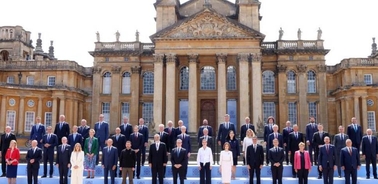Discover the GPC’s latest report: “The European Political Community: Navigating the Path to Consolidation”

The Global Policy Center recently published the policy brief “The European Political Community: Navigating the Path to Consolidation,” authored by Dr. Ilke Toygür and Sébastien Maillard, Special Advisor to the Jacques Delors Institute. Jointly developed with the Jacques Delors Institute and the SciencesPo Paris School of International Affairs (PSIA), this paper provides timely policy recommendations. It emphasizes the importance of strategic alignment going into the fourth and fifth European Political Community (EPC) summits in the United Kingdom and Hungary in 2024.
The EPC has emerged as a critical platform for fostering pan-European dialogue and coordination amid pressing geopolitical challenges. Founded in Prague on October 6, 2022 against the backdrop of Russia’s invasion of Ukraine, the EPC aims to provide a flexible yet cohesive platform to address shared foreign and security policy concerns.
Fostering strategic intimacy
Unlike traditional EU frameworks, the EPC deliberately includes both EU and non-EU nations, such as the United Kingdom, Turkey, Norway and Azerbaijan, while excluding Belarus and Russia. This inclusivity fosters what French President Emmanuel Macron has termed “strategic intimacy” among European leaders, enabling meaningful dialogue across diverse political and strategic priorities.
With summits already held in Chisinau and Granada, the EPC has demonstrated its potential to serve as a unifying forum addressing Europe’s urgent needs, from security to energy and migration. The Blenheim Summit near Oxford could serve as an opportunity to strengthen ties with key partners, particularly the United Kingdom and Turkey, and to further advance foreign policy coordination with candidate countries. Discussions on Ukraine remain central to the agenda, reflecting the EPC’s commitment to countering Russian aggression and supporting European solidarity.
Making recommendations
The report argues that while the EPC’s flexibility and informal approach have been assets, some degree of institutionalization is necessary to ensure ownership of the agenda, define deliverables and maintain momentum. It recommends leveraging the EPC to advance EU enlargement goals, support candidate countries and consolidate Europe’s collective response to geopolitical challenges.
The 2024 summits also present opportunities to solidify the EPC’s role in fostering equitable partnerships across the continent. Decisions on new summit hosts—potentially Albania and Denmark for 2025—should reflect a commitment to inclusivity and collaboration. In a fragmented geopolitical landscape, the EPC’s adaptability and strategic focus can help address Europe’s foreign and security policy challenges, forging stronger bonds among its leaders while navigating the path to consolidation.